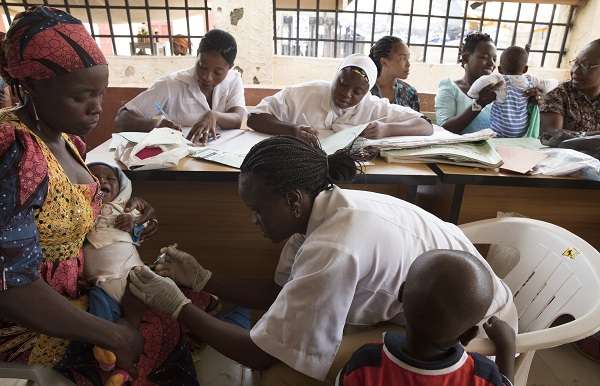TECHNISCHE UNIVERSITÄT BERLIN, GERMANY
Course: Global Cites Local Spaces
TOPIC:
THE NEED FOR CO-PRODUCTION AND IMPROVEMENT IN THE NIGERIA HEALTHCARE SYSTEM
written by Babatunde Oladogba

Fig. 1: The need to revisit the Nigerian health sector: Mothers have their babies vaccinated at the Primary Health Care Maraba, in Karu, Nigeria on June 19, 2018. Photo © Dominic Chavez/GFF
Today, the involvement of citizens in the co-production of public service is becoming evident both in public management and administration, and now the government has seen the citizens as a core figure in the implementation and design of public services and policies (Taco et al., 2018: 3). The example presented in this context looked into co-production partnership of secondary healthcare services which involve health professionals, unemployed health professionals, elites, and citizens in order to ameliorate the standard of secondary health care services in Nigeria, which has fallen in recent times.
But a logical question to ask is does the government have sufficient resources and stable political will to ensure the best health care services for its citizens? this question reveals the crucial breach in the current system in which health professionals seek to connect.
In the world where Nigeria has about 2% of inhabitants, more than 13% of children in Nigeria don’t live to mark their fifth birthday, over 14% global maternal demise, and more than 50% of citizens live in penury (see Global Partnership, 2015). The case of Kwara being one of Nigeria’s poorest states however recorded a successful healthcare co-production under a public-private partnership in 2007 (see Global partnership, 2015). Yet, it comes as no surprise that citizens in most of the informal settlements in Nigeria suffer more due to negligence.
We can’t discuss secondary healthcare in Nigeria without a pick into primary health care, hence, the lacking primary healthcare causes an influx of people searching for medical care on higher levels. Taking into account that there are about 30,000 primary healthcare establishments across Nigeria, only 20% of them are functioning (Vivian, 2018). Thus, the need to revisit the Nigerian health sector is a necessity (see Fig 1).
The consequence of government instability are inadequate amenities, insufficient infrastructures, and joblessness to mention but a few. These problems have been a master driver for health professionals, some of whom are unemployed, to engage in co-production partnerships with societal elites and citizens with a critical look into core healthcare services. Health professionals who are the major planners have however devised other means of gathering funds to run their facilities due to inadequate funding. The planners organized a forum called the Hospital League of Friends (HLF), the successful results of the forum’s contribution include; the provision of power generation installations, the construction of automated water facilities, and the construction of additional hospital buildings (Mary Mangai et al., 2018: 2).
Another crucial factor that shifts health professionals towards co-production is the shortage of official personnel. Due to the lack of official personnel, health managers use the services of unemployed health professionals who are willing to volunteer in hospitals. These unemployed health professionals are often regarded as casual workers (Mary Mangai et al., 2018: 3). The prime motive of these casual workers for engaging in co-production is the belief that they will one day be fully employed but their expectations are mostly unfulfilled. It is no doubt that this co-production partnership has created a good ground for health professionals, unemployed health professionals, elites, and citizens to address their problems without waiting for the government.
The case illustrates the ability of the planners who are successful in this context, but the power relationships in this partnership are unevenly distributed. However, it is uncertain that this relationship would work in the future on the fact that casual workers often display negative behavior. This behavior makes me curious that as long as they don’t get permanent positions, the progressive provision of core health services is uncertain in the future.
Aside from the binary between successful or unsuccessful cooperation, the example in this context shows the positive potential of co-production processes, and firstly illustrates the need for a balance of power between the actors involved to ensure equality. Secondly, in the notion of (Galuszka, 2018: 11), transformations in urban politics happen as a result of multiple factors, rather than only bottom-up activism. Following this notion, if the government doesn’t take quick actions, bottom-up activism is most like to start from the societal elites or citizens.
On this note, unless government ameliorates the irregularities in the healthcare system, the system will continue to remain unfair to unemployed health professionals who have in one way or the other invested time and savings into the system which, however, is unequal to them. Conclusively, the argument is that the concept of the co-production partnership aforementioned is expected to progress as long as the unemployment rate remains high and the government doesn’t provide a long-lasting solution.
Bibliography
Galuszka, Jakub (2018) What makes urban governance co-productive? Contradictions in the
current debate on co-production. Planning Theory (00) 0, S. 1 -18.
Global Partnership (2015) Partnering to cover healthcare for Nigeria’s poorest. Available at: http://effectivecooperation.org/2015/01/partnering-to-cover-healthcare-for-nigerias-poorest/ (Accessed: 9 February 2020).
Mary M, Micheal S. de Vries and John A.M. de kruiff (2018) Case Study-Co-Production of Secondary Health Services in Nigeria and Ghana. Available at: https://www.taylorfrancis.com/
books/e/9781315204956/chapters/10.4324/9781315204956-24 (Accessed: 10 February 2020).
Taco brandsen, Trui Steen and Bram Verschuere (2018) Co-Production and Co-Creation:
Engaging Citizen in Public Services. Available at: https://www.taylorfrancis.com/books/e
/9781315204956 (Accessed: 10 February 2020).
Vivian F. (2018) Trace the history of primary health care in Nigeria. Available at: https://www.
legit.ng/1109382-trace-history-primary-health-care-nigeria.html (Accessed: 9 February 2020).
List of Figure
Fig. 1: Available online at: https://zebranewsonline.com/the-need-to-revisit-the-nigerian-health-sector-expert-opinion/ (Accessed: 14 February 2020).




